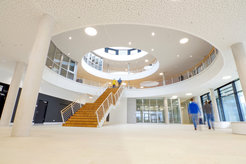A new home for basic research into quantum materials
Opening of the new Institute building in the Science City Hamburg Bahrenfeld
On May 13, the MPSD officially opened its new, state-of-the-art research building in Hamburg. The President of the Max Planck Society (MPG), Professor Patrick Cramer, and the Second Mayor of the Free and Hanseatic City of Hamburg, Science Senator Katharina Fegebank, were guests of honor at the opening ceremony. The MPG President ceremoniously handed over the new building to the Institute.

The expansion building offers optimal conditions for research into quantum materials and enables the Institute to venture into new research directions. It houses low-vibration laboratories coupled with high air purity for the production of micro- and nanostructures. These samples are used to conduct high-precision experiments at high-power laser sources, extremely strong magnetic fields in the 20 Tesla range or ultra-low temperatures close to absolute zero (-273.15° Celsius).
In order to expand from three to five scientific departments, the Institute requires the new research building. There is space for up to 160 scientists in light-flooded offices and common rooms while the award-winning roof garden offers stimulating surroundings for scientific discussions and meetings or as an oasis of relaxation.
Of the total construction costs of 54 million Euro, the City of Hamburg has provided 37 million Euro, with the Max Planck Society contributing the rest.

“We are extremely grateful to the City of Hamburg and the Max Planck Society for their generous support,” said the MPSD’s Managing Director, Ángel Rubio, at the opening ceremony. “This innovative building marks a pivotal moment in our quest to unlock the secrets of quantum materials. Here, within these walls, we will explore the fundamental building blocks of matter, uncover their intricate behavior and harness their potential to revolutionize technology and materials science.”
Hamburg's Senator for Science, Katharina Fegebank, sees the opening as an important step for the city: “The new building for the Max Planck Institute for the Structure and Dynamics of Matter marks a milestone here in Science City Hamburg Bahrenfeld. In this neighborhood, scientists will find everything they need for their excellent research: optimal laboratory conditions, state-of-the-art technology and a unique infrastructure for collaborations. This mix is the stuff that the future is made of. An important step forward that will make Hamburg even more visible as an international center of knowledge and innovation. I would like to congratulate everyone on the opening and thank all those who have contributed to this great success for our city!”
“Top research needs top framework conditions - and the new building is a truly outstanding achievement,” enthuses Max Planck President Patrick Cramer. “The Institute's outstanding basic research in physics will continue to provide groundbreaking findings in the future, helping to pave the way for future technologies such as superconducting networks, biosensors and high-speed computers in the materials sciences.”
Researchers at the MPSD investigate the fundamental properties of matter down to the atomic scale. They have found new ways to control these properties and even use strong laser pulses to put materials into new states that do not occur in nature.
Such states are caused by changes in the atomic and electronic states of matter which take place in millionths of a billionth of a second – in other words, on the time scale of femtoseconds. Complex theoretical models and simulation underpin the experimental work and provide valuable new insights into the materials that can help shape our future.
The Institute is located at the heart of the growing Science City Hamburg Bahrenfeld, which has an outstanding scientific infrastructure and a unique range of high-power laser and X-ray light sources. Scientific collaboration is practised across disciplines and institute boundaries.
Since its foundation in 2014, the MPSD has shared a cooperation building, the neighboring Center for Free-Electron Laser Science (CFEL), with the Deutsches Elektronensynchrotron (DESY) and the University of Hamburg. Some areas of the Institute will remain at CFEL, but the new extension building will now make it possible to establish new departments and research groups.
With the MPSD, the MPI for Meteorology and the MPI for comparative and international Private Law, Hamburg is home to three of the current 84 institutes of the Max Planck Society (MPG). They conduct world-class basic research in the natural sciences, life sciences, social sciences and humanities.













